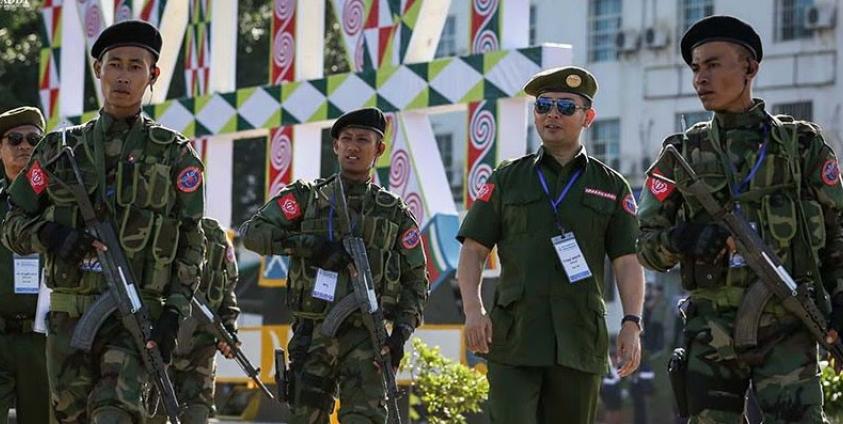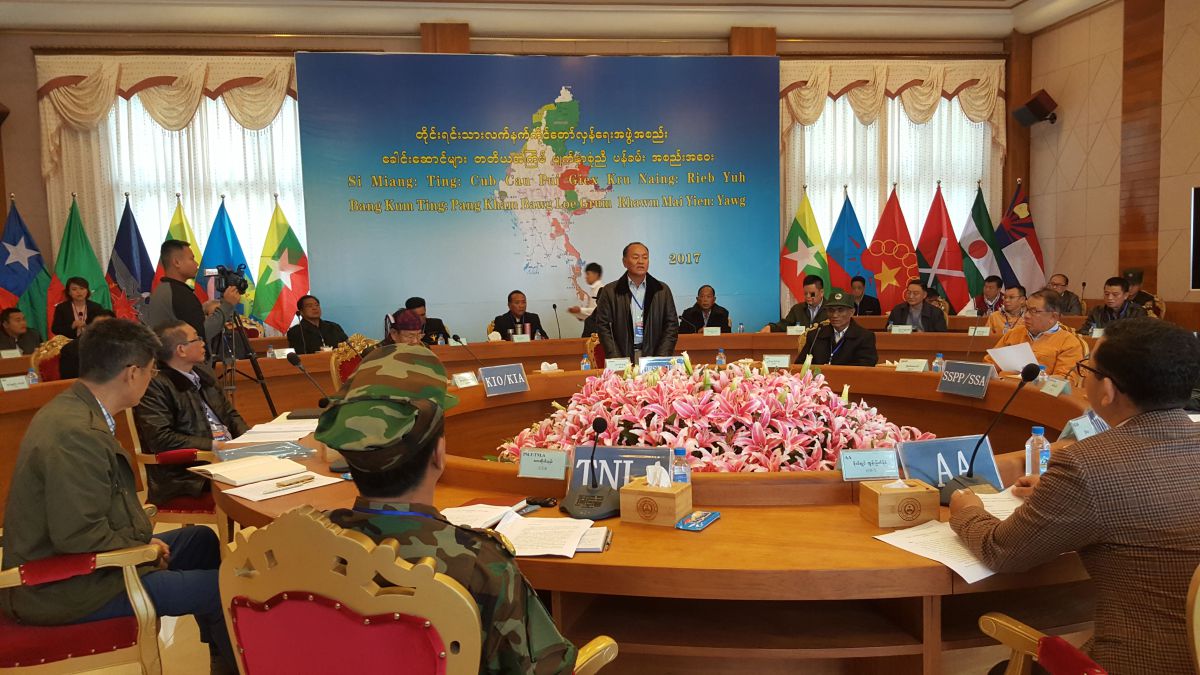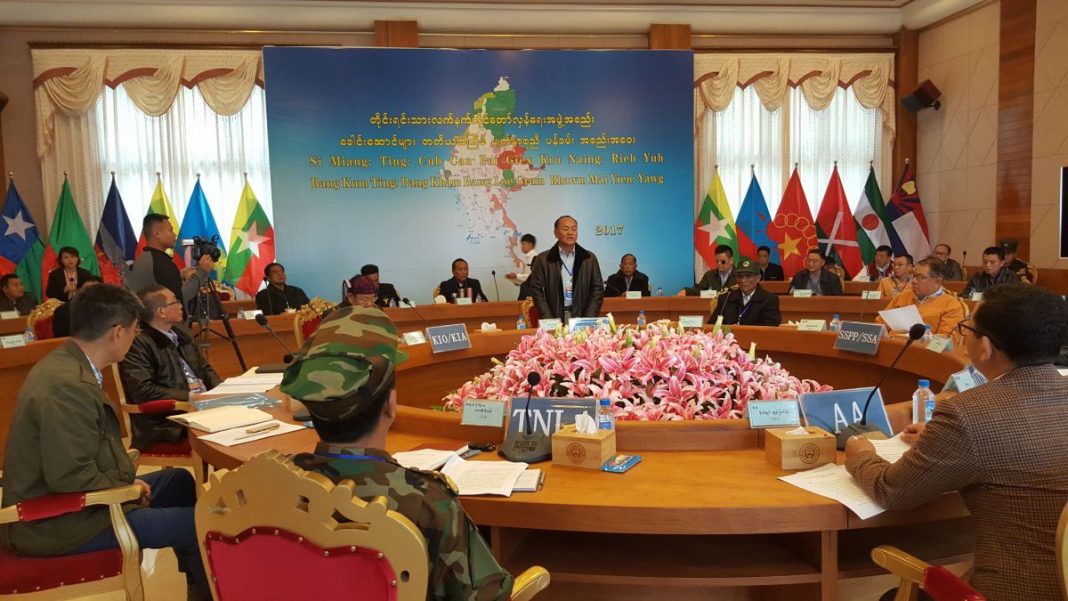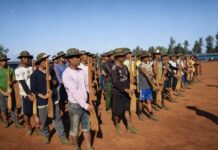On February 25 representatives from Northern Alliance – Burma (NA-B) and the government’s National Reconciliation and Peace Center (NRPC) met for four hours in World Trade Center, Kunming, China’s Yunan Province to discuss the possibility on how the former could participate in the stagnated Nationwide Ceasefire Agreement (NCA)-based peace process. The stagnation is due to the two biggest NCA-signatory Ethnic Armed Organizations’ (EAOs) suspension of participation in the peace process since last year November stating lack of fairness and difference of interpretation in the NCA.

In early December a meeting took place between the NA-B members the Arakan Army (AA), Myanmar National Democratic Alliance Army (MNDAA) and Ta’ang National Liberation Army (TNLA) and the NRPC, followed by the release of a joint statement saying that the alliance wanted the Myanmar Army or Tatmadaw to halt military operations before engaging in a political dialogue and the peace process.
Thereafter, the Tatmadaw announced a four-month-long unilateral ceasefire in five military regions covering Shan and Kachin States on December 21.
In January the Kachin Independence Army (KIA), also member of the NA-B, and the NRPC met again where the former requested for a meeting between the whole group of NA-B. Thus this February meeting is understood as a follow-up of the KIA urging and probably the Tatmadaw’s reconciliation desire with the NA-B for whatever reason, although fierce armed engagements are still ongoing for a few months now with the its alliance member AA in Arakan State, which is not covered by the Tatmadaw’s unilateral ceasefire.
Leaders from the AA, KIA, MNDAA and TNLA met with the NRPC’s Peace Commission (PC), headed by vice chairperson Thein Zaw and included secretary Lt-Gen. Khiin Zaw Oo, member Aung Soe, adviser Hla Maung Shwe and deputy minister of the State Counselor’s Office Khin Maung Tin.
Accordingly, TNLA Maj. Tar Aike Kyaw, who joined the meeting told the media: “It was an informal talk. Each side proposed its ideas for the peace process, so there was no agreement. We told them that we will have a bilateral ceasefire first, then we will sign the NCA,” adding, “we asked them to sign a bilateral deal with our four armed groups at the same time and at the same place.”
For the government’s part, Hla Maung Shwe said: “We explained what the government is presently doing (regarding the peace process). We explained to them on what could be done in order to sign the NCA quickly and also urged them to sign it. That were merely the things we have undertaken.”
Reportedly, on speedily signing the NCA Tar Aike Kyaw told the media: “The meeting now is held between our four groups that are still battling (the Tatmadaw). But if it is real political negotiation all seven organizations have to be involved to be in order. This is our position. That is why whether it is NCA-based or other approaches the government and the FPNCC will have to meet.”
In sum, the NA-B will handle the bilateral ceasefire agreement and the political negotiations, including the NCA signing, which will be handled by the Federal Political Negotiation and Consultative Committee (FPNCC).
FPNCC is made up of seven members, which is NA-B with four members plus United Wa State Army (UWSA), National Democratic Alliance Army (NDAA) and Shan State Progress Party (SSPP).
Tar Aike Kyaw further said that the government’s PC could not give answer and merely said the message will be relayed to the authorities and come back with the answers later.
A more clearer version is explained by political analyst and observer Maung Maung Soe as: “For the moment the line of approach by the NRPC’s PC is that the four groups signed the “Deeds of Commitment” (DOC) first and within the agreed time-frame signed the NCA. It means to sign the NCA soon after the agreement (of DOC). (The government) wants them to sign as quickly as possible.”

He further explained the sequence process could be as: “From four out of remaining three to sign the ceasefire (AA, TNLA, MNDAA) will ink the bilateral ceasefire, after that discussion about NCA signing will take place. If it is undertaken all the seven members will sign the NCA. Apart from that they (FPNCC) would like to air their point of views, make changes and proposed new insertions (in the NCA).”
He stressed: “ I have that kind of view (on the recent meeting). I see that they still need to resolve this small gap.”
The NRPC and Tatmadaw representatives did also met with the SSPP, an FPNCC member, separately in what looks like a positive overture to push the peace process a bit further. Reportedly, the NRPC met the SSPP on February 22 and the Tatmadaw also did the same in Naypyitaw on February 25, in which an offer was made to the SSPP to hold meeting once a month to build mutual trust.
But regarding the AA, the government and as well the Tatmadaw such an olive branch overture is not forthcoming and it seems crushing and annihilation is still the approach, although the Tatmadaw said the line of negotiation is still open.
For now, the NA-B other members haven’t resorted to helping the embattled AA militarily by ignoring the Tatmadaw’s unilateral ceasefire other than just formal protest to end the Tatmadaw’s offensive, while the FPNCC is also doing the same. But after the end of April when the unilateral ceasefire expires, the situation could change depending on how the Tatmadaw reacted to the situation on the ground.
With the impatience of China wanting to end the ethnic armed conflict along the border and beyond in Myanmar to realize its Belt and Road Initiative (BRI) intertwined with the China-Myanmar Economic Corridor (CMEC), the pressure on the FPNCC is undoubtedly very high. At the same time, Chinese insistence on Myanmar to honor its various economic project contractual agreements, in form of payback time for the backing rendered in the United Nations Security Council (UNSC) and elsewhere, due to the Rohingya issue internationally which is a double-edged sword, is weighing heavily on the government.
In such a situation, it will be far more better for the quasi-civilian-military government to look for its inner strength within the country to counter such challenges. In other words, it should stop sending mixed signal regarding the management of ethnic conflict and decide to end the civil war through accommodation of the ethnic nationalities’ aspirations. And the best place to start is opening a comprehensive dialogue with the AA rather than employing the annihilation policy, which will enable to draw in the NA-B and FPNCC into the peace process orbit easier than going to war with one of its member.












Leave a Comments